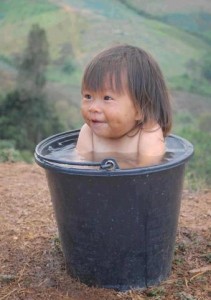 In Italy, Villaggio della Madre e dell Fanciullo was instituted for young unwed mothers during the end of the last war trapped in an intolerant political and religious culture. In 1945, pregnant girls and women returning from concentration camps and those that had been raped by occupying and liberating troops were cast out by condemning families. Elda Mazzocchi Scarzella’s vision was to serve adolescent girl-mothers by respecting, preserving, and supporting the integrity of the mother-child relationship through pregnancy, delivery and early childhood. By women caring for other women, Elda created a safe supporting-residential environment where young women could discover and develop within themselves the capacity to respond appropriately for their own and their child’s well being. Today, it thrives as the Reggio Emilio schools of Italy graduating the most creative, intelligent, self-secure children imaginable.
In Italy, Villaggio della Madre e dell Fanciullo was instituted for young unwed mothers during the end of the last war trapped in an intolerant political and religious culture. In 1945, pregnant girls and women returning from concentration camps and those that had been raped by occupying and liberating troops were cast out by condemning families. Elda Mazzocchi Scarzella’s vision was to serve adolescent girl-mothers by respecting, preserving, and supporting the integrity of the mother-child relationship through pregnancy, delivery and early childhood. By women caring for other women, Elda created a safe supporting-residential environment where young women could discover and develop within themselves the capacity to respond appropriately for their own and their child’s well being. Today, it thrives as the Reggio Emilio schools of Italy graduating the most creative, intelligent, self-secure children imaginable.
In the Reggio Emilia, children are revered and honored because according to its founder, “A school needs to be a place for all children not based on the idea that they are all the same, but that they are all different.” Mothers and children developed a deep respect for each other as beings filled with potential. Children are treated as whole human beings, respected and honored for their innate character. Today, this school is a model of excellence for the world reflected through its exhibition tour around the world The Hundred Languages of Children.
